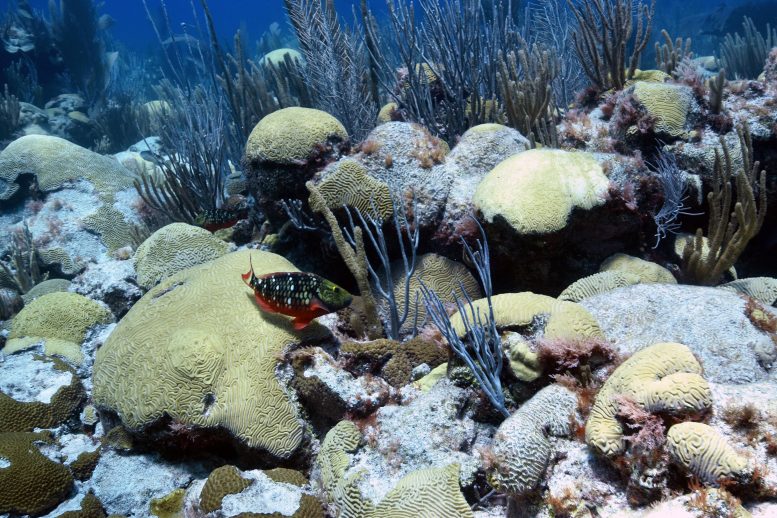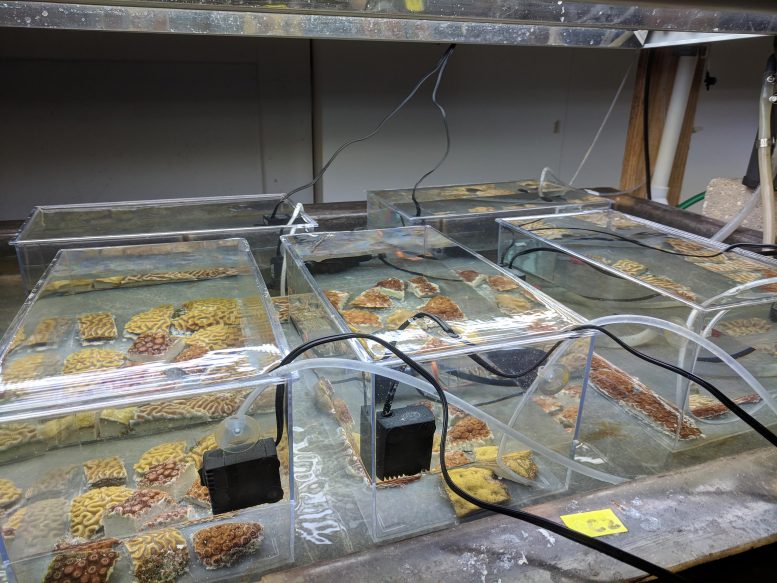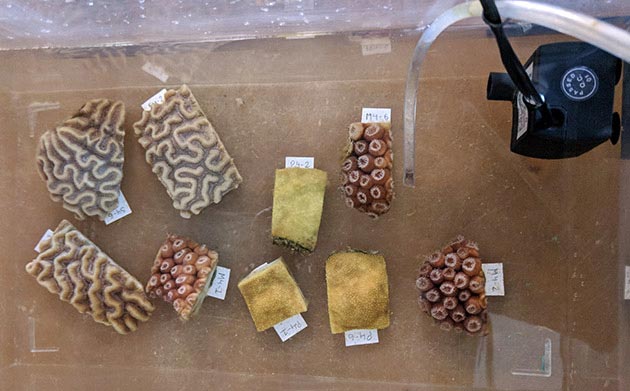
New research shows that pulses of cooler deep water reduced heat stress responses in corals.
The risk of severe coral bleaching—a condition in which corals lose their symbiotic algae, called zooxanthellae—is five times more frequent today than it was forty years ago. Coral bleaching is a direct result of global warming, where rising temperatures cause marine heat waves, which place stress on the living coral animals, as well as the photosynthetic algae on which they depend for energy. This heat stress causes the algae to malfunction, at which point they are expelled by the corals, causing the organisms to lose their color and appear white (thus the term coral “bleaching”).
Due to the increasing pressure of global warming on highly valuable coral reef ecosystems, scientists are now seeking novel ways to decrease heat stress on corals. A new study led by Yvonne Sawall, assistant scientist at the Bermuda Institute of Ocean Sciences (BIOS), is showing potential for the use of artificial upwelling (AU)—or the application of cooler, deep water—as a way to mitigate the thermal stress on corals.

Upwelling is a natural oceanographic process in which winds push surfaces waters away from a region, such as a coastline, allowing the uplift of deep, cold waters to the surface. These waters are typically rich in nutrients and form the basis of productive marine ecosystems which, in turn, support many of the world’s most important commercial fisheries. AU is a geoengineering method that uses pumps to bring deep-ocean water to the surface. Originally designed to fertilize surface waters to increase fish stocks or carbon dioxide (CO2) sequestration, AU may also be used to cool surface waters during heat waves, if the depth and intensity of AU is chosen wisely.
“Ocean warming and the occurrence of heat waves will increase in frequency and intensity over the coming decades and we need to consider rather unconventional solutions to protect and sustain coral reefs,” Sawall said.
With funding from the German Research Foundation (DFG, with principal investigator Yuming Feng, doctoral student at the GEOMAR Helmholtz Center for Ocean Research in Kiel, Germany), Sawall and her co-authors studied three shallow water reef building coral species in Bermuda: Montastrea cavernosa (great star coral), Porites astreoides (mustard hill coral), and Pseododiploria strigosa (symmetrical brain coral).

After collecting fragments from living corals on Sea Venture Shoals, Bermuda, at a depth of 15 feet (5 meters), the research team placed the colonies in aquaria at BIOS to test the effects of deep cold-water pulses (AU) during thermal stress. Fragments were treated with various temperatures conditions, including an average summer temperature (28°C); a heat stress treatment known to cause bleaching (31°C); a heat stress treatment with daily pulses of cooler deep water from a depth of 164 feet (50 m, 24°C); and a heat stress treatment with daily pulses of cooler deep water from a depth of 300 feet (100 m, 20°C). The deep water used for the experiment was collected aboard the BIOS-operated research vessel (R/V) Atlantic Explorer approximately 2 miles (3 km) off the Bermuda Platform.
The results of the study showed that even short intrusions of cooler deep water (less than two hours per day) can mitigate thermal stress in corals. This was evident in higher levels of zooxanthellae performance in corals exposed to heat stress and AU compared to corals that were exposed to heat stress only, and this effect seemed stronger in the simulations with water from deeper depths.
“Our study shows the potential benefits of pulsed AU during heat waves. The next steps now are to find suitable AU settings to maximize the benefits, while minimizing potential harmful side effects of AU for corals and the ecosystem they support,” Sawall said.
Reference: “Discrete Pulses of Cooler Deep Water Can Decelerate Coral Bleaching During Thermal Stress: Implications for Artificial Upwelling During Heat Stress Events” by Yvonne Sawall, Moronke Harris, Mario Lebrato, Marlene Wall and Ellias Yuming Feng, 28 August 2020, Frontiers in Marine Science.
DOI: 10.3389/fmars.2020.00720
The Bermuda Institute of Ocean Sciences is an independent U.S. not-for-profit marine research and educational organization with 501(c)(3) status and a Bermuda Registered Charity (#116).
6 Comments
As a long-retired oceanographer who worked on coral reefs (among other topics), i have a couple of comments. First, I applaud the use of colder water to reduce thermal stress. BUT my concern would be the possible stress of high nutrient loading. Most (although certainly not all) coral reefs are in waters with low nutrient concentrations. Reefs exposed to high nutrient loads often become overgrown by macro-algae. I hope the researchers are giving attention to this possibly deleterious affect of cold (and usually nutrient-rich) water. I hope the reduction of thermal stress is not dramatically overwhelmed by excess nutrient fertilization.
I have a bridge I can sell you. reefreliefarchive.org
If one looks at the actual sea surface temperatures on the Great Barrier Reef they have never been high enough to cause bleaching. Pumping up deep ocean waters won’t help, even if was possible.
https://seatemperature.info/great-barrier-reef-water-temperature.html
“Coral bleaching is a direct result of global warming, where rising temperatures cause marine heat waves.”
Global warming has increased global temperatures by less than one degree C. after over 200 years of adding CO2 to the atmosphere. The warmest sea surface temperatures were in the Persian Gulf in 1924 where reef corals are not dying off. Bleaching took place on the GBR in February 1929. CO2 was still at pre-industrai levels. Global warming is not the cause of bleaching. Many other factors are involved, including human pollution.
One obvious trade off is accelerating mixing of global warming’s surface water BTUs (at whatever salinity) into the deep ocean in new ways and with potentially harmful unintended effects.
Is it possible to grow the alge in warmer waters and prevent the bleeching by seeding the Coral Reefs with the nutrients required to ensure survival of the coral reefs in its pristine unbleeched state? Can the bleeched Coral reefs get back the unbleeched state after such treatment? This assumes that for keeping the coral reefs from bleeching, the same becomes temperature independent in the new warmeer environments environment, given that the assumption that Global Warming and the heating of the Oceans is actUlly reaponible for the Coral Bleeching? If there are other factors, we nned to determine waht these are and address the same.
Trying to pump cold waterto the reef may be like attempting to bail out water from a leaking boat!
Nice to be Don Quixote and charge at windmills thinking they are dragons, but a practical solution to set right the global warming (crisis!!) may be to use finnese to address the effects of the same on the planet including the Coral Reefs.
The usage of fossil fuels is not likely to go down dramatically (given the dependence of the global economy and development priorities of many poorer nations and also th energy economy being nuilt on the same). So we can expect the warming to continue, unless as some environmental scientist predictions of the new Ice Age coming pans out ( Most don’t predict this as of now). In which we will need to worry about extra warm Long Johns and the Coral Reefs will take care of themselves.